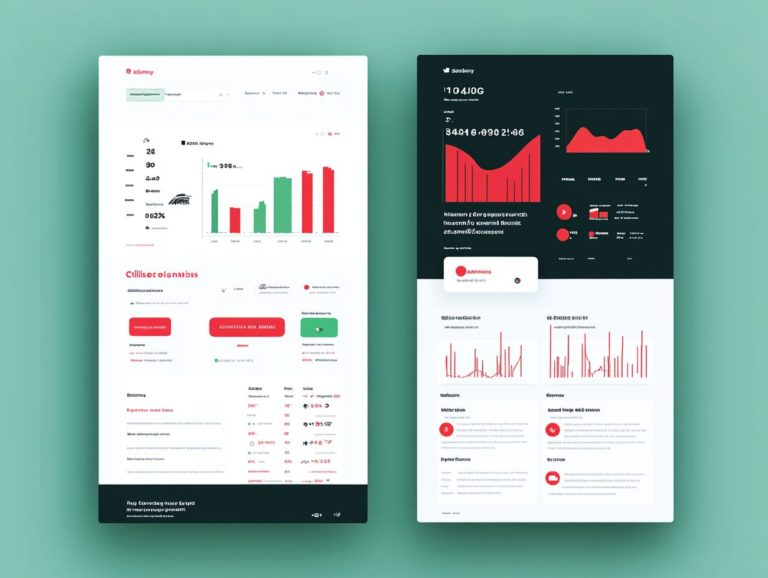How to Conduct Market Research for Leads
Let's Set Up Your Lead Generation Strategy
Fill out the form below, and our team will get in touch with you to create a tailored solution for your business.
In today’s fiercely competitive landscape, grasping the intricacies of your market is vital for generating high-quality leads. This could be the game-changer for your marketing strategy!
Market research acts as the cornerstone of effective strategies, enabling you to pinpoint your target audience, scrutinize competitors, and unearth valuable insights that inform your decision-making process.
This article delves into the essentials of market research for lead generation, highlighting its multitude of benefits and the diverse methods available for data collection. By mastering these techniques, you can sharpen your approach, customize your offerings, and ultimately elevate your success to new heights.
Contents
- Key Takeaways:
- Understanding Market Research for Leads
- Benefits of Conducting Market Research
- Let's Set Up Your Lead Generation Strategy
- Methods of Gathering Market Research Data
- Let's Set Up Your Lead Generation Strategy
- Analyzing and Utilizing Market Research Data
- Frequently Asked Questions
- Let's Set Up Your Lead Generation Strategy
Key Takeaways:

- Identify your target audience s needs to craft effective marketing strategies.
- Use surveys, focus groups, and social media to gather insights about your competitors.
- Analyze market research data to make informed decisions that drive sales and growth.
Understanding Market Research for Leads
Understanding market research for leads is essential in today s ever-evolving business landscape. It offers invaluable insights into consumer behavior, preferences, and emerging market trends.
By harnessing both primary and secondary research methodologies, you can achieve a comprehensive understanding of your target audience while effectively pinpointing their unmet needs. This process involves crafting a detailed description of your ideal customer, along with conducting an in-depth competitive analysis. The ultimate goal is to enhance customer satisfaction and retention strategies.
What is Market Research for Leads?
Market research for leads is a structured way of gathering, analyzing, and interpreting information about your target audience, all aimed at enhancing your lead generation efforts.
This process can be divided into two main types: primary and secondary research. Primary research engages directly with potential customers through methods like surveys, interviews, and focus groups. This gives you firsthand insights into their needs and preferences.
On the flip side, secondary research taps into existing data sources, such as industry reports and academic journals, allowing you to identify trends and understand market conditions. By leveraging these methodologies, you can create a detailed buyer persona that informs your tailored marketing strategies.
Understanding the unique characteristics and motivations of your leads enables you to target them more effectively. Ultimately, this drives sales and nurtures long-term relationships.
Benefits of Conducting Market Research
Conducting market research offers a wealth of advantages that are essential for any business seeking to truly grasp its target audience. It effectively addresses consumer needs and informs your strategies.
This valuable insight enables you to make informed decisions that resonate with your customers.
Identifying Target Audience and Their Needs
Identifying your target audience and their needs is a crucial step in market research that lays the groundwork for creating an effective buyer persona. This process involves market segmentation, breaking down potential consumers into distinct groups based on shared characteristics like demographics, psychographics, and behaviors.
By understanding these segments, you can gain valuable insights into what drives consumer preferences and tailor your offerings to meet those needs. For example, if you’re launching a new eco-friendly product, you might discover through customer feedback that millennials prioritize sustainability.
Use this insight to create compelling campaigns that connect with your audience! As a result, your marketing strategies can be significantly refined, ensuring that your messaging reaches your audience and engages them effectively.
Let's Set Up Your Lead Generation Strategy
Fill out the form below, and our team will get in touch with you to create a tailored solution for your business.
Competitor Analysis and Differentiation

Competitor analysis is an essential part of market research. It helps you grasp market trends and create effective ways to make your product stand out.
By diving into the strengths and weaknesses of rival companies, you’ll discover exciting opportunities in the market. For example, if you notice a competitor gaining traction due to exceptional customer service, you might consider enhancing your own service protocols or exploring innovative ways to engage with your customers.
The insights from this analysis can also highlight pricing strategies that resonate with your target audience. This allows you to refine your pricing models and improve customer satisfaction by delivering unique and valuable offerings.
Methods of Gathering Market Research Data
You have various methods to gather market research data. Each one is tailored to address your specific research questions and objectives.
This approach helps you effectively analyze your competitive landscape and make informed decisions that drive your business forward.
Surveys and Questionnaires
Surveys and questionnaires are invaluable tools in market research, enabling you to collect numbers and statistics on consumer attitudes and preferences.
By crafting effective surveys, you can track trends and reveal deeper insights that guide your decisions. It s essential to formulate well-thought-out research questions; the quality of your data relies on these queries.
Framing your questions clearly is crucial; ambiguity can lead to misinterpretation and compromise your findings. To boost response rates, consider offering incentives or guaranteeing anonymity.
Incorporating open-ended questions can provide richer feedback, helping you gain a more comprehensive understanding of consumer sentiments and preferences.
Focus Groups
Focus groups are a valuable qualitative research method designed to uncover deeper insights into consumer behavior through guided discussions.
These discussions typically involve a small group of participants relevant to your research topic. Selecting these individuals carefully ensures a representative sample with diverse perspectives.
With effective moderation techniques like encouraging open dialogue and creating a comfortable atmosphere you ll enable participants to share their thoughts freely. This interaction generates rich qualitative data that reveals nuances traditional methods might overlook.
By analyzing this feedback, you can derive actionable insights that align your strategies with consumer needs and desires.
Online Research and Social Media Monitoring
Online research and social media monitoring present valuable opportunities for data collection. They allow you to stay in tune with consumer insights and emerging market trends.
Let's Set Up Your Lead Generation Strategy
Fill out the form below, and our team will get in touch with you to create a tailored solution for your business.
By leveraging various tools, you can sift through vast amounts of online content. This helps you gauge public sentiment and identify shifts in consumer preferences.
Techniques like sentiment analysis the process of understanding how people feel about your brand social listening, and how people interact with your posts enable you to understand audience interactions across platforms.
Utilizing platforms like Hootsuite or Brandwatch can significantly enhance this process, allowing you to track conversations in real-time!
Ultimately, harnessing these insights facilitates data-driven decision-making. This ensures your strategies align seamlessly with consumer demands and aspirations outlined in your action plan.
Analyzing and Utilizing Market Research Data

Analyzing and utilizing market research data is crucial for making informed decisions. This enables you to adapt your strategies based on insightful market statistics and valuable customer feedback. This ensures that your business remains agile and responsive to ever-changing demands.
Interpreting Data and Making Informed Decisions
Interpreting data effectively is essential for your decision-making process. It enables you to tackle research questions with clarity and precision.
Explore various data types to unlock powerful insights! Data can be broadly categorized into qualitative and quantitative types. Qualitative data, often collected through interviews or open-ended surveys, provides rich insights into consumer experiences, beliefs, and motivations. In contrast, quantitative data, derived from numerical sources like surveys and experiments, lends itself to statistical analysis that uncovers patterns and trends.
Understanding how to balance and integrate both types is crucial. Drawing appropriate conclusions from this combination enhances the accuracy of your insights and significantly influences your strategic decisions. For instance, you might pivot your marketing strategy based on consumer feedback, leading to improved brand alignment and heightened customer satisfaction.
Implementing Strategies and Measuring Success
Implementing strategies derived from market research insights is essential for achieving your business objectives and measuring success in customer satisfaction and market growth.
To effectively formulate an action plan based on these findings, break the process down into manageable steps:
- Define objectives: Ensure they align with the gathered data, making every action purpose-driven.
- Identify key performance indicators (KPIs): Use these to gauge the effectiveness of your strategies.
These metrics not only help you assess progress but also allow for real-time adjustments. Embracing a culture of continuous improvement allows you to revisit and refine your strategies, ensuring sustained success and enhanced customer experiences.
Frequently Asked Questions
What is market research for leads?
Market research for leads is the process of gathering information about potential customers or clients in a specific target market to determine their interest in a product or service.
Why is conducting market research for leads important?

Conducting market research for leads helps businesses identify and understand their potential customers, their behaviors, needs, and preferences. This information is crucial for creating effective marketing strategies and generating quality leads.
Let's Set Up Your Lead Generation Strategy
Fill out the form below, and our team will get in touch with you to create a tailored solution for your business.
What are the different methods of conducting market research for leads?
Various methods of conducting market research for leads include:
- Surveys
- Focus groups
- Interviews
- Data analysis
- Online research
Each method has its advantages and can be used based on the business’s needs and resources.
How can market research for leads help my business?
Market research for leads can help your business by:
- Identifying and understanding your target audience
- Improving your products or services based on customer feedback
- Identifying new market opportunities
- Creating effective marketing strategies to generate quality leads
What are the key steps involved in conducting market research for leads?
The key steps in conducting market research for leads are:
- Defining your research objectives
- Identifying your target audience
- Selecting appropriate research methods
- Collecting and analyzing data
- Using insights to improve your marketing efforts and generate quality leads
Start your market research today and transform your business strategies!
How often should market research for leads be conducted?
Do market research regularly, especially when launching a new product or service. It’s also vital when entering new markets or when market conditions change.
Aim to do market research at least once a year. This helps you stay updated on your target audience’s needs and preferences. Want to know what your customers really think? Make market research a priority!






